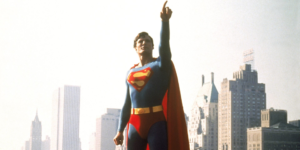Reviewed by GREG KING
Documentary:
Director: Leon Gast
Politics, sports, and music make for a potent mixture in this insightful and entertaining Oscar-winning documentary from acclaimed film maker Leon Gast. When We Were Kings details the behind-the-scenes story of the famous 1974 Ali/Foreman fight, held in Zaire, a small, fairly obscure African country, that has since gone down in sporting legend as the Rumble In The Jungle.
The fight for the world heavyweight crown was packaged by Don King, the flamboyant promoter whom many consider has tarnished the sport beyond repair with his shameless yet colourful entrepreneurial approach to staging fights. Singers and performers of the calibre of BB King and James Brown were also brought along to provide the pre-bout entertainment in a three day music festival celebrating the historic roots of Afro-American identity and consciousness. Amongst the other colourful characters whom we meet during the film is Mobuto Sese Seko, Zaire’s despotic and ruthless dictator, now allegedly one of the world’s richest men although he rules a country divided by war and poverty, who agreed to put up the prize money for the fight from Zaire’s own treasury for unspecified propaganda purposes.
That fight was an astute mix of show business and sport that probably changed the face of boxing forever, and this fascinating documentary captures the excitement and hype as well as the more farcical elements of this history making three-ring circus. When We Were Kings is more than just a documentary about the sport of boxing, as it also taps into a number of important racial and social issues and traces the changing attitudes regarding black Americans during the past quarter of a century. The film was a labour of love that eventually took director Gast some 23 years to complete, and during its troubled genesis, When We Were Kings underwent numerous changes of focus. Although When We Were Kings began as a straight record of the fight, it seemed inevitable that Gast would shape the film and re-edit it many times to finally create an in depth portrait of the mystique and colourful personality of Muhammad Ali himself.
A charming fighter and sportsman, Ali was respected by many for his stand against the Vietnam war, a position that saw him jailed and stripped of his boxing titles. Eventually released on a technicality, Ali set about trying to regain the heavyweight title. In this crucial fight to determine the world championship, Ali was clearly the underdog, facing George Foreman, a younger and fitter opponent, a champion with a fierce reputation for relentlessly pounding boxers into submission. Ali was widely respected and had the ability and potential to do so many positive things to improve the image and self consciousness of his people, who were slowly sinking into an abyss of drugs, crime, poverty and despair, and a win in this fight was crucial. Ali was articulate, charismatic and knew how to manipulate the media, which became especially important during an unanticipated six week delay in the fight that was largely spent playing mind games with his opponent in Zaire.
In 1974 Gast originally shot some 32 hours of film footage, but, due to funding problems upon his return to the States, was unable to have the film developed for nearly 15 years, until co-producer Taylor Hackford (An Officer And A Gentleman, etc) agreed to help bring it to the screen. Hackford has intercut Gast’s original footage with archival material and new footage featuring interviews with many of the famous writers and journalists who witnessed that rugged and unforgettable encounter. Heavyweight commentators such as Pulitzer Prize winning novelist Norman Mailer and outspoken black film director Spike Lee offer their own opinions on the importance of the fight to black Americans as well as its significance to the sporting world in general.
Music also plays an important part in the film, and When We Were Kings features a sensational soundtrack, including James Brown, the Spinners and The Fugees. Even those without much of an interest in either documentaries or the sport of boxing should find When We Were Kings riveting, informative and marvellously entertaining.
★★★★



